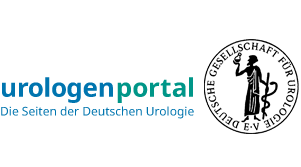

Preisträger 2025
77. Kongress der Deutschen Gesellschaft für Urologie e.V.
17.-20.09.2025 (Hamburg)
Ehrungen / Preisträger:
ERNENNUNGEN
Maximilian Nitze-Medaille:
Prof. Dr. Peter Albers, Düsseldorf
Ritter von Frisch-Preis:
Priv.-Doz. Dr. Stefan Conrad, Hannover
Felix Martin Oberländer-Preis:
Prof. Dr. Jens-Uwe Stolzenburg, Leipzig
Ehrenmitgliedschaft:
Dr. Eva Hellmis, Duisburg
Prof. Dr. Jan Fichtner, Oberhausen
Korrespondierende Mitgliedschaft:
Prof. Dr. Gerd Antes, Freiburg
Prof. Dr. Steffen Krause, Linz (Österreich)
Preis des Präsidenten:
Frau Isabel Edvardsson, Ahrensburg
Botschafterin für die Hamburger Stiftung Mittagskinder und das Kinderhospiz Sternenbrücke
Wolfgang Knipper-Preis:
Adam Kolodziej, Leverkusen
AUSGESCHRIEBENE PREISE:
Bernd Schönberger-Preis:
Fr. Lujza Brunaiova, Bern (Schweiz)
„A rapid review: Quality of life in adult allogenic kidney transplantation in the recent five years - What can we learn?“
Fr. Janine Siegle, Berlin
„Influence of hypothermic and normothermic machine perfusion on renal grafts using a murine model of machine perfusion“
Dora Teleky-Preis:
Priv.-Doz. Dr. Anita Thomas, Mainz
Maximilian Nitze-Preis:
Priv.-Doz. Dr. Dr. Markus Eckstein, Erlangen
„AI allows pre-screening of FGFR3 mutational status using routine histology slides of muscle-invasive bladder cancer“
Prof. Dr. Wolfgang Fendler, Essen
„Combining PSMA-PET and PROMISE to re-define disease stage and riskin patients with prostate cancer: a multicentre retrospective study“
Leopold Casper-Promotionspreis:
Dr. Isis Tara Wolf, Freiburg
„Lightning the Way to Cancer Cell Destruction: Photoimmunotherapy of Prostate Cancer and Prostate Cancer Stem Cells“
Forschungs- und Innovationspreis Urologische Onkologie:
Dr. Gregor Duwe, Mainz
„Development of an artificial intelligence-generated explainable treatment recommendation system für urothelial carcinoma and renal cell carcinoma to support multidisciplinary cancer conferences”
Rudolf Hohenfellner-Preis:
Dr. Mike Wenzel, Frankfurt a.M.
„EPIC-REAP-Projekt (Enhancing Prostate Cancer Care in Germany Combining Real World Data and AI for Enhanced Analysis and Precision)“
Medienpreis Urologie:
Dr. Maria Sprinz, Berlin
Für ihre Aufklärungsvideos über urologische Erkrankungen und vermeintliche Tabuthemen unter „answeringforafriend“ auf Instagramm und TikTok
Alexander von Lichtenberg-Preis:
Urologicum Dr. Ralf Eckert, Eisleben
Filmpreis:
Dr. Leonidas Karapanos, Leverkusen
„Urethroplastik mit doppelseitigem Mundschleim- hauttransplantat (dorsal inlay & ventral onlay) bei obliterativen Harnröhrenstrikturen der Fossa navicularis“
Dr. Georg Schön, Planegg
„The robot-assisted retroperitoneal access: one standard trocar placement fits for all procedures“
Prof. Dr. Christian Wülfing, Hamburg
„Die robotisch-assistierte retroperitoneale Lymphadenektomie - Ergebnisse einer Single- Surgeon Serie“
Vortragspreise experimentell:
1. Preis:
Dr. Tim Schiereck, Wuppertal
“Roboterassistierte radikale Zystektomie: 3D-Modelle und numerische Simulationen zur Entwicklung der optimalen Neoblase“
2. Preis:
Dr. univ. Stephan Brönimann, Wien
“Urine- and plasma-based tumor genomic profiling in patients with upper tract urothelial carcinoma“
3. Preis:
Dr. Margaretha A. Skowron, Düsseldorf
“The molecular characterization of penile carcinomas for the identification of new therapeutic targets“
Vortragspreis Urologia Internationalis:
Dr. Felix Melchior, Innsbruck
„Vorhersage des biochemischen Rezidivs von Prostatakrebs nach radikaler Prostatektomie durch Kollagen-Modelle unter Verwendung von Multi-Omics-Profilen“
Vortragspreise klinisch:
1. Preis:
Prof. Dr. Arkadiusz Miernik, Freiburg
„Kontinuierliche Blasenspülung: Klinische Evaluation eines innovativen Systems zur digitalen und vernetzten Überwachung des Patienten”
2. Preis:
Dr. Kira Schüller, München
“PSA-Wert-Verlauf und PSMA-PET/CT im Therapiemonitoring von Patienten mit hormonsensitivem Prostatakarzinom“
3. Preis:
PD Dr. Stephan Degener, Wuppertal
“WUPSTA - Wuppertaler Ausbildungsstation”
Ferdinand Eisenberger-Forschungsstipendium:
Dr. Maximilian Haak, Mainz
„Etablierung eines mikrofluidischen 3D-Zellkulturmodells zur Simulation und Inhibition einer ossären Metastasierung über die Antagonisierung des CXCR4/CXCL 12 Signal- weges beim rostatakarzinom“
Dr. Jakob Kohler, Kiel
„Using Spatial Transcriptomics to investigate Baldder Cancer Biology and Identify Treatment Response Biomarkers“
Dr. Maurin Hellen Mangold, Mannheim
„"Deep TRUS" Trial - Deep learning- based prostate cancer detection with high frequency TransRectal Micro-UltraSound“
Dr. Marcel Schinger, Würzburg
„LRP8 und SLCA11 als mögliche Zielstrukturen für die Induktion von Ferroptose zur Therapie des fortgeschrittenen Nierenzellkarzinoms“
Manfred Wirth-Stipendium für internationale Forschung: ( NEU )
Dr. Nicolas Carl, Mannheim
„Multi-endoscope 3-dimensional surgical scene reconstruction for AI-driven innovations in workflow Analysis“
Dr. Martin Wallisch, Düsseldorf
„Monitoring disease burden with ctDNA in metastatic urothelial carcinoma under therapy with Enfortumab/Vedotin and Pembrolizumab“
Reisestipendium ‚Die Besten für die Urologie‘:
Robin Böcher, Berlin
Simon Brüne, Ulm
Omaima Buatkala, Homburg
Alileen Heselich, Bonn
LIsa Thuy Nguyen, Mannheim
Felix Kasparbauer, Regensburg
Claudia Mulamba, Lübeck
Jonas Muth, Heidelberg
Marlene Friederike Hessen, Dresden
Nicolas Kajetan von Bohlen, Regensburg
Maximilian Wessendorf, Heidelberg

